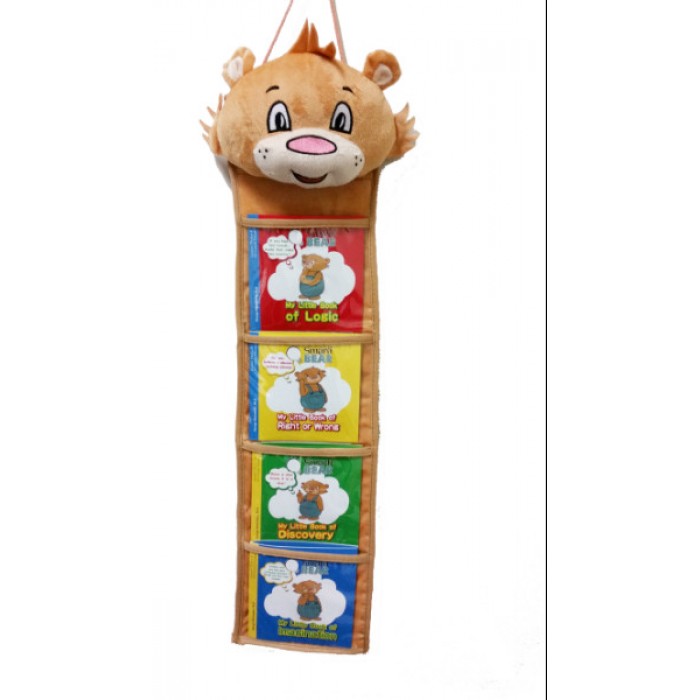| ________________
CM . . .
. Volume XXII Number 15. . . .December 11, 2015
excerpt:
Designed to develop skills of creativity, inquiry, logic and ethics, the “Wisdom for Children” series was written by educator George Ghanotakis, founder of the Canadian Institute of Philosophy for Children and special consultant for K-12 thinking skills programs in various provinces. The books in the series are very small and lightweight, perfect for little hands, but, in fact, they are meant to be read with an adult. Each double-page spread shows Smarti Bear posing a question (13 questions in all) on the left hand page and an accompanying illustration on the right-hand page. At the back of the book, there are tips for parents and teachers, suggested answers by kids, and a list of the skills featured in the specific title. Some of the skills are repeated in different titles. The size and format of the books and the juvenile, cartoon-like illustrations lend themselves to a very young audience, but some of the questions would likely spark some interesting discussion among older readers. There are no “wrong” answers, but readers need to be able to substantiate their responses. Obviously, older readers will have more prior knowledge upon which to base their answers than will younger readers. If children can read the book on their own, they might have a tendency to just think of a quick response. Where the insightful aspect comes in is when an adult engages the child in conversation and guides the discussion. My Little Book of Discovery focuses on inquiry skills such as wondering, understanding, comparing, problem solving, analyzing and evaluating. Some of the questions to ponder include “Does a dog know it’s a dog?” and “Can you touch something but not see it?” A few of the questions require readers to use their prior knowledge and experience, such as “Can something grow without having any roots?” But some of the questions are rather obscure for a young audience: “What’s more real: the number 2 or a tiger?” Language skills, empathy and creativity are a few of the skills featured in My Little Book of Imagination. In this title, readers are given various scenarios and are asked to imagine what might happen. For example, what might happen if you woke up one morning to find that you are now of the opposite sex, or how would living in a world without money change things? One of the questions, “Suppose you were in heaven. What would you rather do: stay there or come back to earth?” assumes that the reader believes in heaven and has some idea of what it is like. To hear a child’s answer to the question would be rather enlightening. Logical skills, such as exploring alternatives, examining evidence, deductive and inductive thinking and distinguishing truth from falsehood are covered in My Little Book of Logic. Some of the questions posed are: “Can you like and dislike the same thing?”, “Can two people disagree and both be wrong?” and “You hear Jack say: ‘You can’t believe anyone.’ Do you believe Jack?” My Little Book of Right or Wrong develops ethics skills, among others the values of courage and honesty, examining consequences and avoiding stereotypes. In this title, readers are asked if they think that all of the animals in the zoo should be freed, whether some animals have more rights than others, and if they think that there are situations in which it’s okay to break a promise. Though the various questions presented in each of the titles vary in difficulty and require different thought processes, one thing is certain: parents and teachers will likely be amazed at the answers given to them by the youngsters in their charge. These titles are guaranteed to spark good discussion as well as provide many teachable moments. There are, however, other similar materials available that are more worthy of purchase than these little books. Recommended with Reservations. Gail Hamilton is a former teacher-librarian in Winnipeg, MB.
To comment on this title or this review, send mail to cm@umanitoba.ca.
Copyright © the Manitoba Library Association. Reproduction for personal use is permitted only if this copyright notice is maintained. Any
other reproduction is prohibited without permission.
CM Home |
Next Review |
Table of Contents for This Issue - December 11, 2015
| Back Issues | Search | CM Archive
| Profiles Archive |
